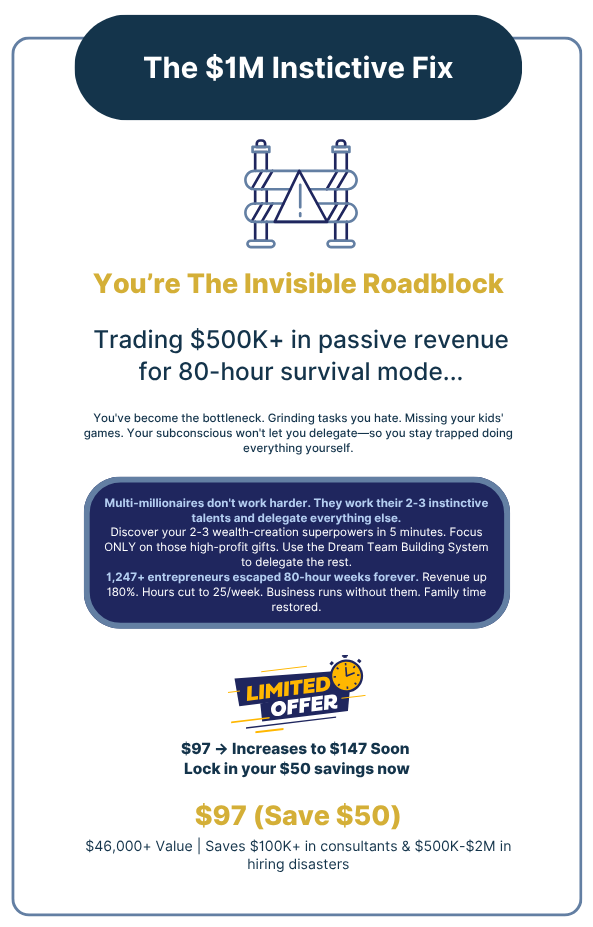Your Two Financial Minds
You've just learned about observer consciousness. But you're still grinding 70-hour weeks. Still hitting the same wealth ceiling. Still can't build the passive income systems you desperately want.
Why? Because understanding observer consciousness is just the first step—you still don't know WHAT'S IN YOUR SUBCONSCIOUS that's sabotaging everything.
You've learned how to observe your mental activity and distinguish junk thinking from strategic clarity.
But here's what you haven't discovered yet: WHAT is actually in your subconscious that's blocking your passive wealth?
You have TWO minds making financial decisions:
Conscious Mind
The planner you're aware of. It sets goals, learns strategies, and makes rational plans.
But it doesn't make final decisions.
Subconscious Mind
The hidden controller programmed in childhood. It actually makes the decisions.
And it decides 2-7 seconds BEFORE your conscious mind knows.
This explains why smart people make poor money choices, why great strategies fail to execute, and why breakthroughs are followed by setbacks.
Your results come from what your subconscious allows—not what you know, not which mind you observe, and not which strategy you apply.
The 7-Second Takeover: Why Observer Consciousness Isn't Enough
You've learned to observe your thinking. That's powerful. But here's what neuroscience reveals:
Your subconscious makes the decision 7 seconds BEFORE you become aware of it.
This sequence happens with every financial decision—in business, investing, sales, and trading:
|
1 Decision point arises (opportunity, risk, or challenge) 2 Subconscious evaluates against childhood programming 3 You feel an emotional reaction (anxiety, excitement, resistance) 4 Your conscious mind creates a "rational" explanation for the feeling 5 You believe you chose consciously |
 |
This happens hundreds of times daily—completely outside your awareness.
Example:
Tom avoided sales calls despite needing clients. His subconscious, programmed by childhood TV stereotypes of "slimy salespeople," created resistance. His conscious mind justified: "I should perfect the product first."
The truth: Your logical mind is the subconscious mind's puppet.
Every financial decision you think you make? Already decided by your subconscious.
Your logic doesn't choose—it justifies.
You tell yourself:
• "I was busy."
• "The timing isn't right."
• "I'll do it later."
• "I need more information."
These aren't conscious choices—they're pre-programmed responses keeping you in familiar patterns.
This means: Until you audit and reprogram your subconscious beliefs, you will keep repeating the same financial patterns—no matter how masterfully you observe your thinking.
The Internal Wealth War
Your conscious and subconscious minds have opposing priorities—creating constant internal conflict:
Conscious Mind Wants:▸ Growth ▸ Opportunity ▸ Wealth expansion ▸ Strategic thinking ▸ Passive income systems |
Subconscious Mind Wants:▸ Safety ▸ Familiarity ▸ Social belonging ▸ Emotional protection ▸ Status quo preservation |
This conflict appears as:
→ Procrastination on high-value activities
→ Anxiety about clear opportunities
→ Strong starts followed by fading momentum
→ Self-sabotage just before breakthroughs
Example 1:
A client saw a clear investment opportunity but felt physically ill when acting. His conscious mind said "invest" while his subconscious screamed "danger."
Example 2:
A business owner planned expansion but repeatedly delayed hiring. Her conscious mind wanted growth while her subconscious, programmed by childhood betrayal, silently vetoed with fear and mistrust.

It's like letting a 5-year-old make your financial decisions. And that 5-year-old wins every time—unless you reprogram the subconscious.
Your Subconscious Wealth Ceiling
No matter what strategies you learn or which minds you master observing, you cannot exceed your subconscious wealth ceiling.
|
Conscious Mind "$1M+" (Your Goal) |
Subconscious Mind "$100K" (WINS Every Time) |
Guess which one wins?

Your wealth ceiling reveals itself through:
→ Reaching the same income level repeatedly
→ Success followed by self-sabotage
→ Health issues appearing with financial growth
→ "Losing interest" near new income levels
→ Uncharacteristic mistakes during success
Example:
Michael built three separate businesses. Each grew to approximately AU$300,000 before "unexpected problems" emerged—matching his father's peak income. His subconscious wouldn't allow him to surpass his father.
Remember: This isn't mindset—it's neuroscience.
If your subconscious wealth ceiling is lower than your goal, your subconscious wins. Every single time.
Quick Assessment: What's your highest sustained income? That's likely your current ceiling.
How Subconscious Beliefs Get Installed—And Control Your Wealth
Before age 7, your brain operates primarily in a theta state—absorbing everything without questioning or filtering.
During this stage, your subconscious is programmed through:

Repetition (Verbal)
Statements heard repeatedly: "Money is hard to get," "Rich people are greedy"
Emotional Imprinting (Non-Verbal)
Emotional charge around money—stress, fear, scarcity in your household
Observation (Non-Verbal)
Watching how parents, teachers, society handled money, success, and risk
Direct Experience (Non-Verbal)
Moments of financial stress, reward, or punishment that shaped lifelong associations
Authority Figures (Both)
What you were told AND shown by parents, schools, religion, culture as "truth" about money
You didn't choose this programming—but it still controls your financial decisions today.
Your subconscious wealth programming was installed before you could think critically.
The good news? We use the same theta state to reprogram the subconscious—but this time, by choice, with beliefs that serve your wealth goals.
The Warring Sub-Personalities Within You
Your personality isn't unified—it's made up of multiple parts that we often push into the subconscious. Yet these hidden sub-personalities control your financial decisions through the 7-second rule.
The Over-Protective Guardian
Avoids all risk, even profitable ones. Prioritizes safety over opportunity.
The Hard Worker
Believes wealth only comes through struggle. Rejects easy paths to money.
The Rebel
Resists financial structure. Sabotages systems that would create wealth.
The People-Pleaser
Undercharges consistently. Fears rejection more than poverty.
The Avoider
Ignores financial planning. Creates "money blindness" to numbers.
The Over-Spender
Uses money emotionally. Creates constant resource drainage.

Until you bring these hidden parts into awareness, you'll keep hitting the same financial walls.
The Hidden Connection: Your Subconscious Blocks Your Instinctive Talents
Here's what the wealth industry won't tell you:
Your subconscious programming doesn't just sabotage your decisions—it specifically blocks access to your 2-3 instinctive wealth-creation superpowers.
The ultra-wealthy don't just reprogram their subconscious. They also identify which mental functions are their instinctive talents, then build passive income systems around those gifts.
Think about it:
If strategic thinking is your instinctive talent, but your subconscious has a "Hard Worker" sub-personality, you'll resist building systems and keep grinding manually
If intuitive pattern recognition is your instinctive talent, but your subconscious demands "logical proof," you'll ignore your greatest asset
If logical analysis is your instinctive talent, but your subconscious has "impatience" programming, you'll rush decisions and bypass your superpower
💎 This is why the Wealth Traits Report is essential:
It reveals your 2-3 instinctive wealth-creation superpowers in 5 minutes—showing you which mental functions are your natural gifts.
Then, you can identify which subconscious patterns are specifically blocking those talents.

The ultra-wealthy master BOTH dimensions: They reprogram subconscious blocks AND build passive income systems around their instinctive talents. 1,247+ entrepreneurs have used this combination to escape 80-hour weeks.
When Your Two Minds Finally Align
When your subconscious reprogramming succeeds, everything changes:
Your Brain Optimizes
→ Notice possibilities others miss
→ Synchronicities appear frequently
→ Creative solutions emerge effortlessly
Internal Resistance Disappears
→ Actions that felt difficult become automatic
→ Procrastination dissolves naturally
→ Energy previously fighting yourself becomes available
Your Strategies Finally Work
→ Knowledge you possess becomes implementable
→ Tactics produce their intended results
→ Your skills and talents express fully
Your Wealth Identity Transforms
→ Financial decisions become instinctively sound
→ Fear-based reactions fade away
→ Comfort with wealth increases automatically

This isn't wishful thinking. It's the natural result of removing subconscious blocks that were limiting your conscious intentions.
Your brain was designed to create prosperity. Your subconscious wealth programming was the only barrier.
Your Path Forward: The Complete System
The ultra-wealthy master three dimensions simultaneously:
Observer Consciousness
Master your mental landscape and distinguish valuable thinking from junk
Subconscious Reprogramming
Identify and rewrite the childhood programming sabotaging your wealth
Instinctive Talent Mapping
Discover your 2-3 superpowers and build passive income systems around them
You've learned #1. Now it's time to master #2 and #3.
You've Completed The Observer Consciousness Training
Now it's time to complete the other two dimensions: Identify your subconscious blocks + Discover your instinctive talents.
These special rates? Only available on this page. Only available now.
Close this page and you'll never see the $200 one-on-one rate or $97 Wealth Traits pricing again.
Your Two Financial Minds
You've just learned about observer consciousness. But you're still grinding 70-hour weeks. Still hitting the same wealth ceiling. Still can't build the passive income systems you desperately want.
Why? Because understanding observer consciousness is just the first step—you still don't know WHAT'S IN YOUR SUBCONSCIOUS that's sabotaging everything.
You've learned how to observe your mental activity and distinguish junk thinking from strategic clarity.
But here's what you haven't discovered yet: WHAT is actually in your subconscious that's blocking your passive wealth?
You have TWO minds making financial decisions:
Conscious Mind
The planner you're aware of. It sets goals, learns strategies, and makes rational plans.
But it doesn't make final decisions.
Subconscious Mind
The hidden controller programmed in childhood. It actually makes the decisions.
And it decides 2-7 seconds BEFORE your conscious mind knows.
This explains why smart people make poor money choices, why great strategies fail to execute, and why breakthroughs are followed by setbacks.
Your results come from what your subconscious allows—not what you know, not which mind you observe, and not which strategy you apply.
The 7-Second Takeover: Why Observer Consciousness Isn't Enough
You've learned to observe your thinking. That's powerful. But here's what neuroscience reveals:
Your subconscious makes the decision 7 seconds BEFORE you become aware of it.
This sequence happens with every financial decision—in business, investing, sales, and trading:

1 Decision point arises (opportunity, risk, or challenge)
2 Subconscious evaluates against childhood programming
3 You feel an emotional reaction (anxiety, excitement, resistance)
4 Your conscious mind creates a "rational" explanation for the feeling
5 You believe you chose consciously
This happens hundreds of times daily—completely outside your awareness.
Example:
Tom avoided sales calls despite needing clients. His subconscious, programmed by childhood TV stereotypes of "slimy salespeople," created resistance. His conscious mind justified: "I should perfect the product first."
The truth: Your logical mind is the subconscious mind's puppet.
Every financial decision you think you make? Already decided by your subconscious.
Your logic doesn't choose—it justifies.
You tell yourself:
• "I was busy."
• "The timing isn't right."
• "I'll do it later."
• "I need more information."
These aren't conscious choices—they're pre-programmed responses keeping you in familiar patterns.
This means: Until you audit and reprogram your subconscious beliefs, you will keep repeating the same financial patterns—no matter how masterfully you observe your thinking.
The Internal Wealth War
Your conscious and subconscious minds have opposing priorities—creating constant internal conflict:
Conscious Mind Wants:
▸ Growth
▸ Opportunity
▸ Wealth expansion
▸ Strategic thinking
▸ Passive income systems
Subconscious Mind Wants:
▸ Safety
▸ Familiarity
▸ Social belonging
▸ Emotional protection
▸ Status quo preservation
This conflict appears as:
→ Procrastination on high-value activities
→ Anxiety about clear opportunities
→ Strong starts followed by fading momentum
→ Self-sabotage just before breakthroughs
Example 1:
A client saw a clear investment opportunity but felt physically ill when acting. His conscious mind said "invest" while his subconscious screamed "danger."
Example 2:
A business owner planned expansion but repeatedly delayed hiring. Her conscious mind wanted growth while her subconscious, programmed by childhood betrayal, silently vetoed with fear and mistrust.

It's like letting a 5-year-old make your financial decisions. And that 5-year-old wins every time—unless you reprogram the subconscious.
Your Subconscious Wealth Ceiling
No matter what strategies you learn or which minds you master observing, you cannot exceed your subconscious wealth ceiling.
Conscious Mind
"$1M+"
(Your Goal)
Subconscious Mind
"$100K"
(WINS Every Time)
Guess which one wins?

Your wealth ceiling reveals itself through:
→ Reaching the same income level repeatedly
→ Success followed by self-sabotage
→ Health issues appearing with financial growth
→ "Losing interest" near new income levels
→ Uncharacteristic mistakes during success
Example:
Michael built three separate businesses. Each grew to approximately AU$300,000 before "unexpected problems" emerged—matching his father's peak income. His subconscious wouldn't allow him to surpass his father.
Remember: This isn't mindset—it's neuroscience.
If your subconscious wealth ceiling is lower than your goal, your subconscious wins. Every single time.
Quick Assessment: What's your highest sustained income? That's likely your current ceiling.
How Subconscious Beliefs Get Installed—And Control Your Wealth
Before age 7, your brain operates primarily in a theta state—absorbing everything without questioning or filtering.
During this stage, your subconscious is programmed through:

Repetition
(Verbal)
Statements heard repeatedly: "Money is hard to get," "Rich people are greedy"
Emotional Imprinting
(Non-Verbal)
Emotional charge around money—stress, fear, scarcity in your household
Observation
(Non-Verbal)
Watching how parents, teachers, society handled money, success, and risk
Direct Experience
(Non-Verbal)
Moments of financial stress, reward, or punishment that shaped lifelong associations
Authority Figures
(Both)
What you were told AND shown by parents, schools, religion, culture as "truth" about money
You didn't choose this programming—but it still controls your financial decisions today.
Your subconscious wealth programming was installed before you could think critically.
The good news? We use the same theta state to reprogram the subconscious—but this time, by choice, with beliefs that serve your wealth goals.
The Warring Sub-Personalities Within You
Your personality isn't unified—it's made up of multiple parts that we often push into the subconscious. Yet these hidden sub-personalities control your financial decisions through the 7-second rule.
🛡️
The Over-Protective Guardian
Avoids all risk, even profitable ones. Prioritizes safety over opportunity.
💪
The Hard Worker
Believes wealth only comes through struggle. Rejects easy paths to money.
🎸
The Rebel
Resists financial structure. Sabotages systems that would create wealth.
🤝
The People-Pleaser
Undercharges consistently. Fears rejection more than poverty.
🙈
The Avoider
Ignores financial planning. Creates "money blindness" to numbers.
💸
The Over-Spender
Uses money emotionally. Creates constant resource drainage.

Until you bring these hidden parts into awareness, you'll keep hitting the same financial walls.
The Hidden Connection: Your Subconscious Blocks Your Instinctive Talents
Here's what the wealth industry won't tell you:
Your subconscious programming doesn't just sabotage your decisions—it specifically blocks access to your 2-3 instinctive wealth-creation superpowers.
The ultra-wealthy don't just reprogram their subconscious. They also identify which mental functions are their instinctive talents, then build passive income systems around those gifts.
Think about it:
🧠
If strategic thinking is your instinctive talent, but your subconscious has a "Hard Worker" sub-personality, you'll resist building systems and keep grinding manually
💡
If intuitive pattern recognition is your instinctive talent, but your subconscious demands "logical proof," you'll ignore your greatest asset
📊
If logical analysis is your instinctive talent, but your subconscious has "impatience" programming, you'll rush decisions and bypass your superpower
💎 This is why the Wealth Traits Report is essential:
It reveals your 2-3 instinctive wealth-creation superpowers in 5 minutes—showing you which mental functions are your natural gifts.
Then, you can identify which subconscious patterns are specifically blocking those talents.

The ultra-wealthy master BOTH dimensions: They reprogram subconscious blocks AND build passive income systems around their instinctive talents. 1,247+ entrepreneurs have used this combination to escape 80-hour weeks.
When Your Two Minds Finally Align
When your subconscious reprogramming succeeds, everything changes:
Your Brain Optimizes
→ Notice possibilities others miss
→ Synchronicities appear frequently
→ Creative solutions emerge effortlessly
Internal Resistance Disappears
→ Actions that felt difficult become automatic
→ Procrastination dissolves naturally
→ Energy previously fighting yourself becomes available
Your Strategies Finally Work
→ Knowledge you possess becomes implementable
→ Tactics produce their intended results
→ Your skills and talents express fully
Your Wealth Identity Transforms
→ Financial decisions become instinctively sound
→ Fear-based reactions fade away
→ Comfort with wealth increases automatically

This isn't wishful thinking. It's the natural result of removing subconscious blocks that were limiting your conscious intentions.
Your brain was designed to create prosperity. Your subconscious wealth programming was the only barrier.
Your Path Forward: The Complete System
The ultra-wealthy master three dimensions simultaneously:
Observer Consciousness
Master your mental landscape and distinguish valuable thinking from junk
Subconscious Reprogramming
Identify and rewrite the childhood programming sabotaging your wealth
Instinctive Talent Mapping
Discover your 2-3 superpowers and build passive income systems around them
You've learned #1. Now it's time to master #2 and #3.
You've Completed The Observer Consciousness Training
Now it's time to complete the other two dimensions: Identify your subconscious blocks + Discover your instinctive talents.
These special rates? Only available on this page. Only available now.
Close this page and you'll never see the $200 one-on-one rate or $97 Wealth Traits pricing again.





